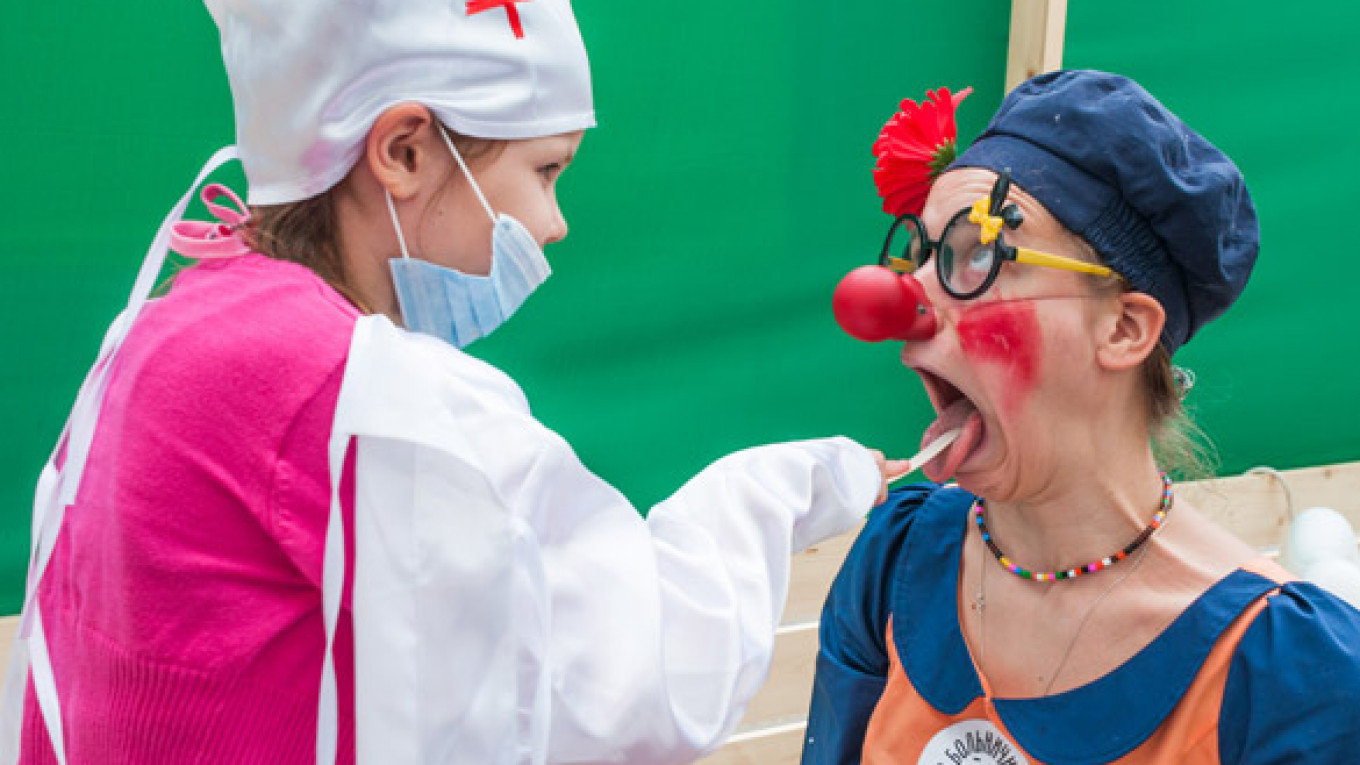If you’ve ever visited a Russian state hospital for children, you understand how miserable, sad and pessimistic it can be to spend long periods of time there, especially through the eyes of a kid. But even the gloomiest hospital can seem to have a complete makeover if a hospital clown appears.
The “Ryzhy” family festival will be held next week in the Hermitage Garden. It was created by a Russian non-profit organization, “Hospital Clowns,” whose goal is purely to make children happy, believing laughter to play an important role in the road to recovery.
Although organized with disabled, developmentally disadvantaged and orphaned children in mind, kids both with and without disabilities will spend the whole day with 140 clowns — 60 professionals and 80 volunteer hospital clowns — in the Hermitage Garden playing games, dancing, and generally having as much fun as possible. Music will feature prominently, and Russian groups such as “Masha and the Bears” will perform, with a rendition of Camille Saint-Saëns’ “Carnival of the Animals” also taking place.
After opening with a photo exhibit of the clowns’ work, there will be contests, food and candies. Kids will get the chance to play different games, heal “seriously ill” clowns, jump on trampolines, and enter competitions in order to win toys and presents.
The “Hospital Clowns” organization was founded a couple of years ago by professional clown Konstantin Sedov. He started out on his own, just going to children’s’ hospitals to play with sick children in order to imbue in them a more joyful outlook and encourage laughter.
He wanted to help kids who have physical disabilities or psychological traumas in a different way, not using medication but making positive emotions.
“The idea to found a special clown organization was my own; I wanted to work as a clown and also wanted to be useful to people,” Sedov said. “Then I found that there are a lot of organizations in the world who do the same and they have been working for about 30 years already.”
Sedov confessed that his relatives and friends did not take the idea of creating an entire organization out of his “Hospital Clowns” idea seriously, but they supported and helped him despite their reservations.
Sometimes doctors in hospitals did not understand Sedov, he said, making it difficult to get his plan off the ground, he said.
However, he did not give up, he followed through with his initiative and opened an organization that now includes about 55 professional hospital clowns. He says they are afraid of nothing.
“Hospital clowns” has gathered affiliates in 5 cities: Moscow, St. Petersburg, Rostov, Oryol and Kazan, working with more than 24 hospitals over the country. Sedov stated that they had plans to open clown schools in Kazan and Rostov and in other big cities on a nationwide level.
Being a non-profit organization, they are looking for sponsorship all the time; they do not have a stable sponsor. However, there are some people who always try to help them and donate money. The people who work as hospital clowns tend to be professional actors, directors, musicians and others who really love their jobs and just want to make children happy — to make “difficult life just a little easier and more fun,” the organization says.
The Ryzhy family festival opens on July 28 at 2 p.m. in the Hermitage Garden, 3 Karetny Ryad. Metro Chekhovskaya.
Contact the author at artsreporter@imedia.ru
A Message from The Moscow Times:
Dear readers,
We are facing unprecedented challenges. Russia's Prosecutor General's Office has designated The Moscow Times as an "undesirable" organization, criminalizing our work and putting our staff at risk of prosecution. This follows our earlier unjust labeling as a "foreign agent."
These actions are direct attempts to silence independent journalism in Russia. The authorities claim our work "discredits the decisions of the Russian leadership." We see things differently: we strive to provide accurate, unbiased reporting on Russia.
We, the journalists of The Moscow Times, refuse to be silenced. But to continue our work, we need your help.
Your support, no matter how small, makes a world of difference. If you can, please support us monthly starting from just $2. It's quick to set up, and every contribution makes a significant impact.
By supporting The Moscow Times, you're defending open, independent journalism in the face of repression. Thank you for standing with us.
Remind me later.






